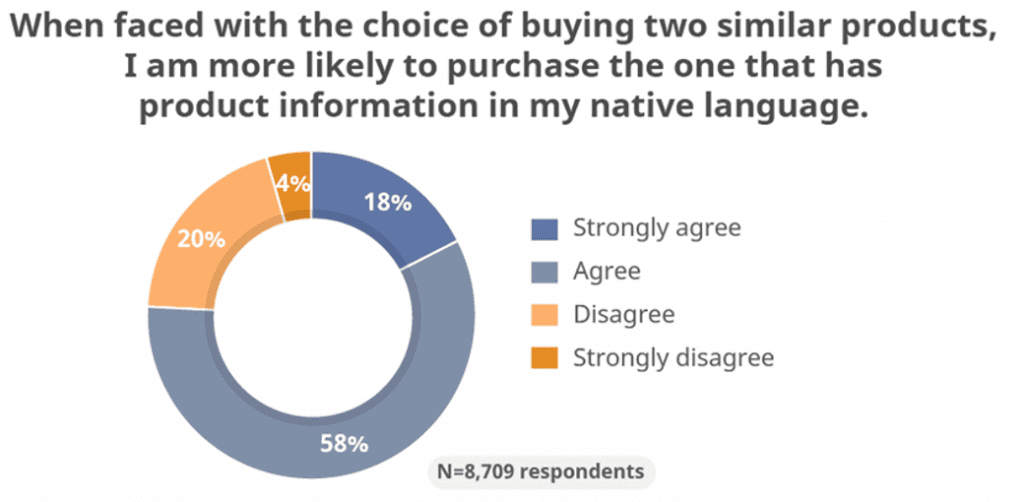
While the digital transformation has been ongoing for years, the current COVID-19 situation finally gave it a massive push. Virtual is now more real than ever, opening doors to new opportunities that were unthinkable before the pandemic. COVID-19 has hit many industries hard and, likewise, bolstered others. Now that these virtual borders are easier to cross, expanding the search for new client bases is much more facile. Let’s examine in this blog what this means for you.
The Power of Localization
Have you ever experienced that slight panicky feeling when traveling? For example, trying to decipher the menu in that off-the-beaten-path diner in Thailand? Or staring blankly at a Greek police officer who is trying to give you directions, but you have no clue what he or she is saying? This panicky feeling is only logical, because everyone wants to understand what they are eating, buying, renting, signing or being told.
When selling your products or services across borders, you want to avoid this apprehension in your customers. What you want is for your target audience to perfectly understand your added value. Your message should be conveyed accurately, retain its original meaning, and not lose its power.
To do this, localization is an important, strategic step in giving your customers a fluid experience and creating a loyal base.
What is it and how does it work? In this series of 3 blogs we are going to dive into the concept of localization, which is an excellent tool to convey your story, your arguments, and your unique selling points to your target audiences across the globe.
Localization Advantage
Localization in business can be divided into two types: translation of information (legal documents, manuals, reports) and transcreation of creative, emotion-driven content (advertising campaigns, marketing).
Localization gives you a clear advantage in developing a loyal customer base that is inclusive and welcoming because you address them in the language and tone of voice that they identify with the most: their own. As such, it greatly increases the likelihood that they return and recommend your product to others.
Along the same lines, it’s important to know that improperly used or unnatural expressions have the exact opposite effect: they will estrange your audience or blemish the image that took you so long to cultivate. Readers of your message may perceive the words you have written, but simultaneously feel that the text was not – truly – written for them.
Localization — For Your Clients Only?
If the type of localization described above is mainly about reaching your customer base so that they find you, understand you and choose to buy from you, there are also two other very important reasons for localization.
Laws and Regulation
One good argument to localize is to comply with local laws, terminology and writing conventions. For example, a localized translation of your Terms and Conditions is not only a nice courtesy, it is sometimes even required by law. This may feel like a cost, but keep in mind that date and currency formats, measurements and technical terms are often not fully understood if not properly translated and localized. Unfortunately, this is often not detected until it’s already gone wrong, with the miscommunication already there, the damage done and you having to invest a lot of time, money and energy to repair it.
Team Spirit
Another excellent reason to localize is to help you reach and build loyalty in your international teams. Companies with such teams normally have one corporate language (often English); however, if you want to guarantee that your teams are thoroughly trained in all critical processes, provide them with e-learning modules and materials in their own language. Likewise, to make sure that your mission and vision are not only heard but also truly felt and understood corporate-wide, make them available in the languages of your team. Localization supports your in-house loyalty initiatives and weaves your vision and mission into the fabric of your company’s heart, which positively influences your customers’ perception of your company as well.
Invest in Localization
In an economic reality that is becoming even more interconnected (and especially now that ‘digitalization’ eliminates physical distance to other markets), communicating in the right language – namely your customers’ – can be the deciding factor for success. This is also confirmed by a large study conducted by Common Sense Advisory, published in their report Can’t Read, Won’t Buy (2020):

To find out more about the localization advantage, we would like to invite you to read our upcoming blogs too. Part 2 and 3 will dive deeper into the elements that play a role in localization and cover the options you have for translating and localizing different types of content related to different industries.
In the meantime, feel free to comment below! We would love to hear from you.
About The Author

Eveline van Sandick, founder and CEO of Attached – language intelligence based in the Netherlands, spotted the importance of bridging language and cultural barriers in economic trade years ahead of other businesses. This year, Attached celebrates its 20th anniversary and marks the establishment of a second office in Toronto, Canada.
In 2017, Eveline received one of the Enterprising Women of the Year Awards, followed in 2019 by the Business of the Year Award from the Netherlands-Canada Chamber of Commerce.









Leave A Comment